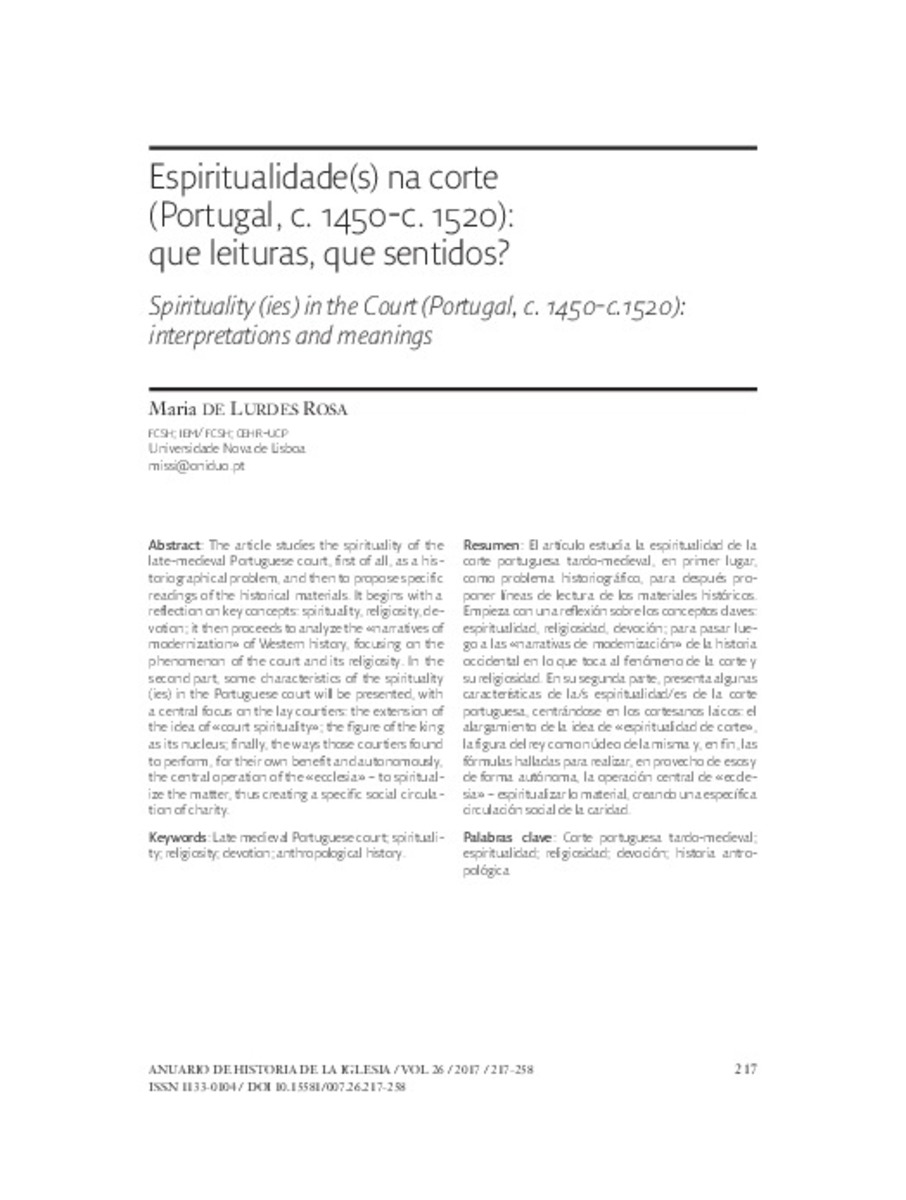Full metadata record
| DC Field | Value | Language |
|---|---|---|
| dc.creator | De-Ludes-Rosa, M. (María) | - |
| dc.date.accessioned | 2017-10-24T11:46:51Z | - |
| dc.date.available | 2017-10-24T11:46:51Z | - |
| dc.date.issued | 2017 | - |
| dc.identifier.citation | De-Ludes-Rosa, M. (María). "Espiritualidade(s) na corte (Portugal, c. 1450-c. 1520): que leituras, que sentidos?". Anuario de Historia de la Iglesia. 26, 2017, 218 - 258 | es |
| dc.identifier.issn | 1133-0104 | - |
| dc.identifier.uri | https://hdl.handle.net/10171/44499 | - |
| dc.description.abstract | El artículo estudia la espiritualidad de la corte portuguesa tardo-medieval, en primer lugar, como problema historiográfico, para después proponer líneas de lectura de los materiales históricos. Empieza con una reflexión sobre los conceptos claves: espiritualidad, religiosidad, devoción; para pasar luego a las «narrativas de modernización» de la historia occidental en lo que toca al fenómeno de la corte y su religiosidad. En su segunda parte, presenta algunas características de la/s espiritualidad/es de la corte portuguesa, centrándose en los cortesanos laicos: el alargamiento de la idea de «espiritualidad de corte», la figura del rey como núcleo de la misma y, en fin, las fórmulas halladas para realizar, en provecho de esos y de forma autónoma, la operación central de «ecclesia» – espiritualizar lo material, creando una específica circulación social de la caridad. | es_ES |
| dc.description.abstract | The article studies the spirituality of the late-medieval Portuguese court, first of all, as a historiographical problem, and then to propose specific readings of the historical materials. It begins with a reflection on key concepts: spirituality, religiosity, devotion; it then proceeds to analyze the «narratives of modernization» of Western history, focusing on the phenomenon of the court and its religiosity. In the second part, some characteristics of the spirituality (ies) in the Portuguese court will be presented, with a central focus on the lay courtiers: the extension of the idea of «court spirituality»; the figure of the king as its nucleus; finally, the ways those courtiers found to perform, for their own benefit and autonomously, the central operation of the «ecclesia» – to spiritualize the matter, thus creating a specific social circulation of charity. | es_ES |
| dc.language.iso | spa | es_ES |
| dc.publisher | Servicio de Publicaciones de la Universidad de Navarra | es_ES |
| dc.rights | info:eu-repo/semantics/openAccess | es_ES |
| dc.subject | Corte portuguesa tardo-medieval | es_ES |
| dc.subject | espiritualidad | es_ES |
| dc.subject | religiosidad | es_ES |
| dc.subject | devoción | es_ES |
| dc.subject | historia antropológica | es_ES |
| dc.subject | Late medieval Portuguese court | es_ES |
| dc.subject | spirituality | es_ES |
| dc.subject | religiosity | es_ES |
| dc.subject | devotion | es_ES |
| dc.subject | anthropological history | es_ES |
| dc.title | Espiritualidade(s) na corte (Portugal, c. 1450-c. 1520): que leituras, que sentidos? | es_ES |
| dc.title.alternative | Spirituality (ies) in the Court (Portugal, c. 1450-c.1520): interpretations and meanings | es_ES |
| dc.type | info:eu-repo/semantics/article | es_ES |
| dc.identifier.doi | 10.15581/007.26.217-258 | es_ES |
| dadun.citation.endingPage | 258 | es_ES |
| dadun.citation.publicationName | Anuario de Historia de la Iglesia | es_ES |
| dadun.citation.startingPage | 218 | es_ES |
| dadun.citation.volume | 26 | es_ES |
Files in This Item:
Statistics and impact
Items in Dadun are protected by copyright, with all rights reserved, unless otherwise indicated.






